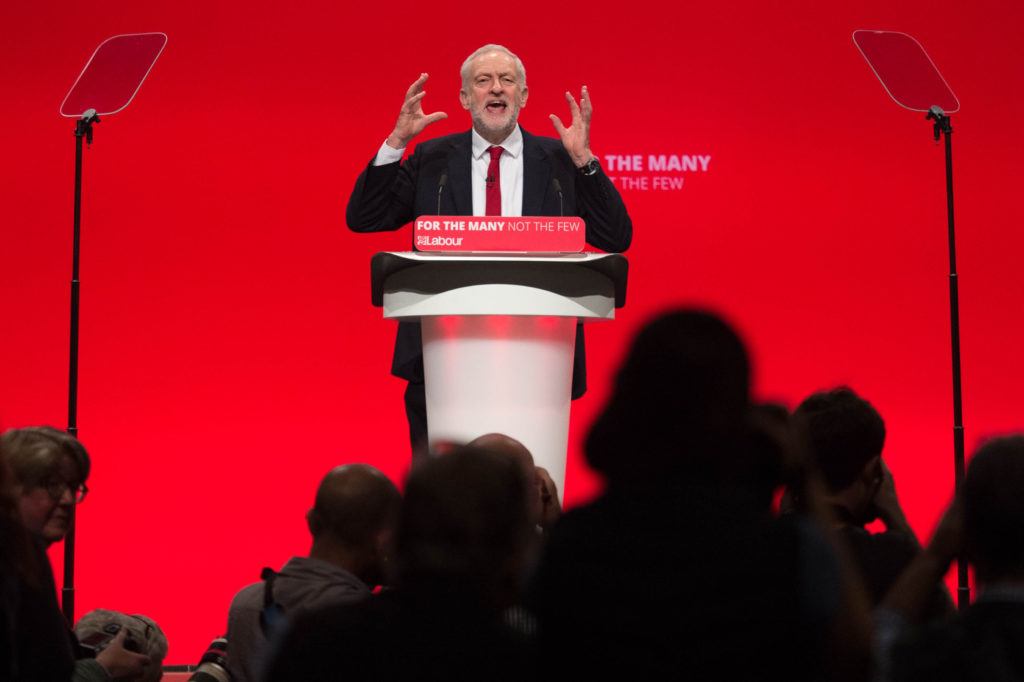Stefan Rousseau/PA Wire/PA Images
After this week’s Labour Party conference, I have one overriding, and faintly surprising conclusion: Jeremy Corbyn wants to win a general election and become prime minister.
That’s surprising because a year ago I’m not sure it was true, or at least that Mr Corbyn thought winning elections was important enough to make compromises and sacrifices for. This conference, well-organised, disciplined and even professional, confirms a change that it was first possible to glimpse in this year’s election campaign. Mr Corbyn is now doing politics in much the same way as other politicians do.
By that I mean he is deliberately taking positions that will maximise his chances of winning votes, and putting that objective above adhering to his principles. For all the noisy headlines about nationalising utilities and scrapping (at least some) PFI deals, Corbyn Labour’s policy platform is not quite the agenda of the firebreathing socialist the Daily Mail would like him to be.
Scrapping tuition fees, keeping the triple lock and the winter fuel payment are all essentially forms of middle class welfare, handing public money (some of it raised from workers on the lowest incomes) to some people who don’t really need it, under the rubric of ‘universalism’.

And what is Labour’s detailed policy on welfare cuts? I don’t know and neither did any of the Labour MPs I spoke to in Brighton. All we got from Mr Corbyn in his very long speech was a very short sentence – “we are very clear: we will stop the cuts to social security” – which once again proved that when a politician talks about being “clear” they are usually being anything but.
And then there’s Brexit, where Mr Corbyn is doing nothing to stand in the way of an outcome whose short-term economic harms will very likely be felt most keenly by those on low incomes.
Team Corbyn’s calculation here is one that many Tories might find familiar. The Labour high command is betting that Mr Corbyn has banked so much credibility as a man who wants to help the poor and vulnerable that he doesn’t need detailed policies to do that and can get away with stuff aimed at reassuring or wooing other voters. The Tory corollary is on fiscal credibility: Tories often take for granted that voters will trust them with the public finances, giving them some credibility to “spend” in fiscal giveaways to favoured groups.
Perhaps the sharpest irony of Mr Corbyn’s transformation into a cynical, vote-grubbing political hack is that his avowed enemies are helping him do it: those who condemn him as a dangerous lunatic driven by Marxist dogma to destroy the UK economy don’t just miss the deliberate calculation behind the Corbyn agenda, they help him build up credibility with followers who might, under other circumstances, object to a Labour leadership that wanted to hand bags of money to middle-class families, offered little help to the very poorest and was quite content to watch Britain crash out of the Single Market and end freedom of movement.
In short, Tories preparing for their party conference should be rather worried by Mr Corbyn because he – and possibly more importantly, the people around him – are now committed to running the sort of disciplined, calculating political operation that wins general elections.
Yet at the same time, they might reflect that Mr Corbyn’s positioning, while more deft than is often appreciated, also offers them opportunities.
They should start by reading a report published this week by my friends at the Joseph Rowntree Foundation (Disclosure: the JRF is financial supporter of the Social Market Foundation, which I run.) That report, by Matthew Goodwin and Oliver Heath, looks at low income voters, more often referred to by politicians and journalists as ‘poor’ or sometimes ‘working class’.
The report’s most important conclusion is that while the Tory commitment to Brexit (and the cultural conservatism it entails on immigration) is prized by many low-income voters, it’s not as important to them as the economic redistribution they associate with Mr Corbyn’s Labour.
Simply, a lot of poorer voters want Britain to leave the EU and cut immigration but what they want more are policies that will give them more money.
Some of those voters did make the switch from Labour to Tory at the 2017 election, possibly because the Conservatives took some cautious steps towards the sort of economic rebalancing they want. Hence there are now Tory MPs in places such as Stoke South and North East Derbyshire, poor places that a supposed anti-poverty warrior like Mr Corbyn should surely have held with ease.
This, of course, was the political design behind the (in)famous Tory manifesto, written by the Prime Minister’s former chief of staff, Nick Timothy, with its talk of fairer markets and policies aimed at taking some money from older, richer people and giving it to poorer ones. It still wasn’t a stunningly progressive document, but it was a step in that direction and importantly, Labour’s offer was scarcely more progressive.
That may explain why, as the JRF report finds, the Labour lead over the Conservatives among low income voters wasn’t as wide as a lot of London-based commentators might expect: 42% to 37%. Jeremy Corbyn, champion of the poor, leads a party that isn’t that much more popular among poor voters than the Conservatives.
Of course, Theresa May and her party didn’t really follow through on the thinking behind the Timothy manifesto, instead campaigning solely on the supposedly safe issue of Brexit and spectacularly abandoning one of the genuinely progressive policies in it, the “dementia tax”. That’s why seats like Chester and Dewsbury and Dudley North and Newcastle under Lyme all stayed with Labour in June.
The refusal to campaign on the “country fair for all” agenda Mrs May set out on the Downing Street step last summer remains one of the great acts of political self-harm in recent history, a failure of courage that ranks alongside Gordon Brown’s decision not to call his snap election in 2007 – both suffered irreversible damage because they didn’t dare to be bold.
As a result, it will almost inevitably fall to another Tory leader to try to stop Mr Corbyn reaching No 10 whenever the next election comes.
Most Tories who are thinking about that challenge and about the party’s future are (not unreasonably) thinking about housing and policies aimed at creating more owner-occupiers. They see politics as divided along the young/old axis, and think about how the Tories can reach out to younger voters.
There’s a logic to that, but age isn’t everything: ‘rich/poor’ matters as much as ‘young/old’.
The Tories’ thinking time is limited and might be better spent pondering the chance Mr Corbyn has given them to make a much better offer to low-income voters. To return to the Timothy agenda and develop it, producing a much better policy offer for the poor.
On housing: yes, ownership matters and goodness knows there should be more and cheaper houses to buy. But better, longer tenancies and more social housing (built by central government if needs be) matter much more to people with low incomes, and could be delivered more quickly than the fundamental rebalancing of our dysfunctional market that will be needed to enable more people to own.
Social mobility deserves an essay in itself, but I’ll try to be concise: it’s not just about exam results – social capital, families, role models and aspiration matter at least as much; the white working class still need more help and attention, not least in coastal towns; further and technical education should be considered as important as universities – instead of competing with Mr Corbyn to subsidise undergraduate degrees, Tories should supercharge FE colleges.
More important than any of this is income: somebody needs to make sure poor people have more money.

People who work while claiming benefits should be able to keep more of those benefits. George Osborne is gone from the Commons but the worst of his legacy remains: his cut in the work allowance in Universal Credit (the amount someone can earn before starting to lose benefits) is a £3 billion annual penalty imposed on the working poor. The Conservatives, who often say they believe in rewarding effort and industry, should find a way to reverse it and hand the poorest workers a pay rise – not least because Mr Corbyn doesn’t seem interested in doing do.
That won’t be cheap, of course. So maybe it’s time, as David Laws argued here last week, to stop raising the starting threshold for income tax, since doing so means allocating a lot of money to many people who are some way from the bottom of the income scale, and instead focus that cash on those at the very bottom. Each £500 increase in the income tax threshold costs £3 billion a year, coincidentally.
Although attention is rightly turning to the implementation of Universal Credit, the broader issue of how the benefits system rewards those who work still deserves much more political attention.
Yet instead of talking about the working poor, politicians are more likely to focus on public sector workers – they got lots of love in Mr Corbyn’s speech, and moderate Tories are keen to do better by them too.
There’s nothing wrong with that, but here’s an awkward fact that few of those politicians want to address: most public sector workers aren’t poor. Falling real wages mean they’re not having a great time, but teachers, firefighters and police officers are all still doing much better than the genuinely poor.
This awkward fact, by the way, is rather important to Mr Corbyn’s friends in the trade union movement. Trade unions today are essentially bodies that represent public sector workers (barely one in ten private sector employees are unionised) and their members are not, by and large, in the bottom income decile.
Whether or not that helps explain Mr Corbyn’s lack of a detailed policy offer for those on the lowest incomes and his focus on public sector workers is a debatable matter.
What is certain is that there’s a gap in the political market for someone to offer the poorest workers a better deal and better representation. Could the Conservative Party find a way to offer those workers something Labour and the trade unions don’t seem able or willing to give? That is, at the very least, something that Tories pondering the future should think about.
Mr Corbyn appears to think he doesn’t need to do or say much for benefits claimants and the working poor, because his followers will take him on trust and his opponents will never dare to challenge him on that battlefield.
In politics, as in sport, if you’re in any doubt about what to do, do the thing your opponent least wants you to do – and stop doing the things he wants you to do.
Accusing Mr Corbyn of a wicked plot to soak the rich isn’t just ineffective, it’s counterproductive: it’s what he wants the Conservatives and their friends to do. He even said as much in his conference speech this week.
But what about a Conservative Party that dedicated itself to the working poor and a better deal for the worst-off? That Tory party could make Mr Corbyn rather less comfortable, reap some real electoral rewards – and, most important of all – help people who deserve a lot better from politicians of all parties.







Join the discussion
Join like minded readers that support our journalism by becoming a paid subscriber
To join the discussion in the comments, become a paid subscriber.
Join like minded readers that support our journalism, read unlimited articles and enjoy other subscriber-only benefits.
Subscribe